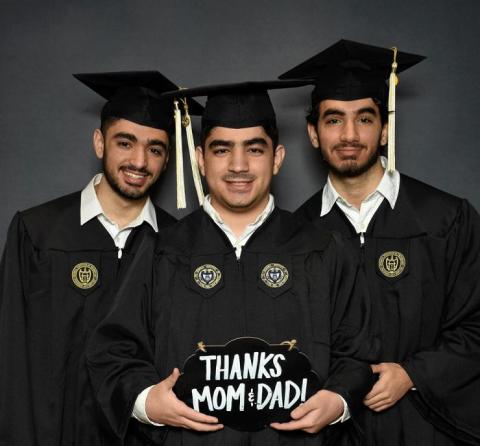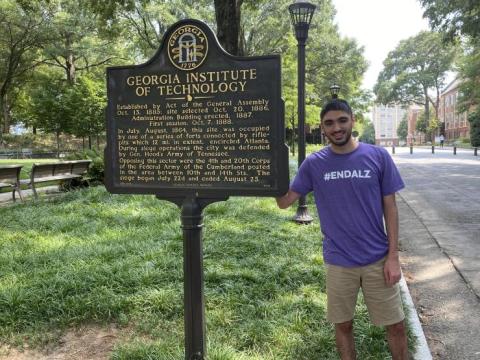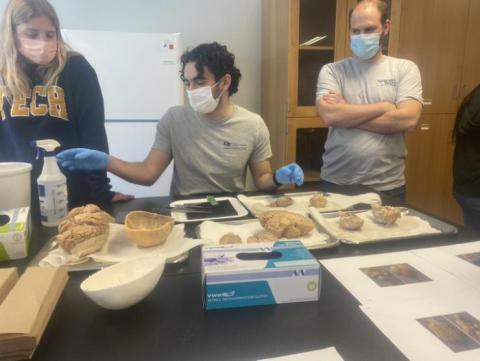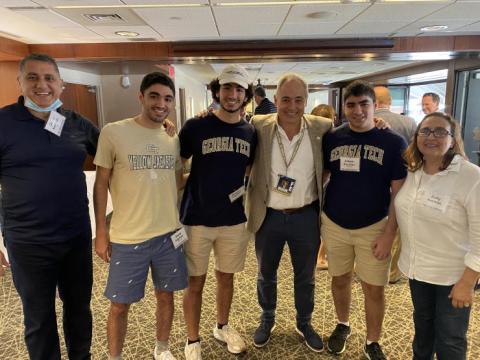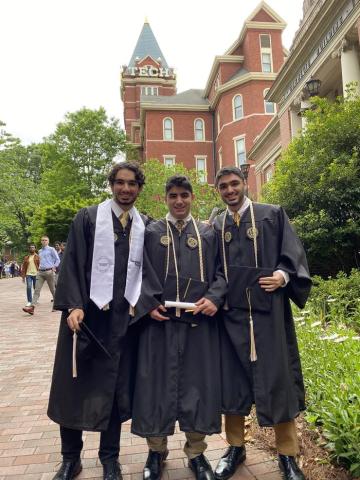As triplets, Adam, Rommi, and Zane Kashlan are used to doing things together. After three years at Georgia Tech, the brothers added one more thing to that list: graduating with a trio of Bachelor of Science in Neuroscience degrees this past May and gearing up for medical school.
Neuroscience is the fastest growing undergraduate major in the College of Sciences at Georgia Tech, and prospective and current students often enjoy hearing from our alumni about their experiences in the program.
We recently spoke with the NEURO ‘22 Kashlan brothers about their time at Georgia Tech, advice for students, and a look at what’s next on the horizon:
MAJORING IN NEUROSCIENCE
Why did you decide to study Neuroscience at Georgia Tech?
Zane: The Neuroscience program at Georgia Tech is unique in that it's incredibly interdisciplinary. As Neuroscience majors, students can freely take courses in Georgia Tech's top-ranked programs like engineering, computer science, and even business on top of a regular course load filled with biology and other science core curricula.
In addition, the broad nature of the curriculum offers students an opportunity to explore all areas of Neuroscience, including Biological Neuroscience, Neuroengineering, Computational Neuroscience, and several other pathways that help develop essential lifelong skills. It is a fantastic STEM major to pick as students who want to explore different career paths and pick up different skills. We enjoyed charting our individual experiences within Neuroscience and are so grateful for the advisors and professors who supported us along the way.
What made you all decide to go to Georgia Tech together?
Zane: Georgia Tech has always felt like a second home to us. We were born and grew up in the Atlanta area. Georgia Tech offered a strong list of notable faculty members. The modern campus is big enough to explore different interests in a wide variety of subjects. Tech offered a special place for us to be challenged, make new friends, and grow independently as a trio.
Rommi: I would add the fact that Georgia Tech offered an unparalleled value of education.
Two questions in one: Who were your favorite professors, mentors, TAs — and why?
Rommi: There were so many professors and mentors that helped shape me into the person that I am today. For example, my involvement with Dr. Ragan in the BRAIN Initiative helping promote neuroscience to students in schools around the Atlanta area, enforced my love for neuroscience and giving back to the community. Dr. Decker, who mentored me as a TA, instilled and enforced my passion for teaching. Dr. Shepler, who I worked closely with in mentoring students in Chemistry under the PLUS Program, further deepened my love for teaching science. Dr. Harrison, who guided me through my first teaching experience in the biology department, is another example. Like all other professors, they were vital in facilitating an engaging, fun, and highly memorable learning environment.
Zane: From the very long list of professors I had an extraordinary time learning from, I especially enjoyed being a TA for Dr. Decker in Anatomy and Pathology. Dr. Tyson helped develop my interest in mentoring others and deepening my experience in Organic Chemistry. Dr. Senf provided continuous support in sponsoring the Students Against Alzheimer's organization I helped found and fostered my passion for scientific communication and advocacy. Also, a thank you to the GT 1000 program for allowing me to be a part of mentoring the next generation of Yellow Jackets – Sandi Bramblett and Dr. Rafael Bras for showing me the ropes of leading by example and to Savitra Y Dow and Dr. Lacy Hodges for their constant support.
Adam: I'm so grateful for all the professors I had the privilege of learning from and taking classes with over my tenure at Georgia Tech, such as Dr. Decker, Dr. Tyson, Dr. Holder, Dr. Weigel, Dr. Whyte, Dr. Howitz, Dr. Kerr, Dr. Harrison, and Dr. Duarte. I especially value my experience with Dr. Shepler, with whom I took chemistry in my first year because she made the learning of science meaningful and fun. Dr. Senf helped develop my scientific writing skill, which is critical in neuroscience research. Dr. Ragan, with whom I took NEUR 4001, for learning so much about research methods, proper presentation creation and delivery, paper writing, and making the atmosphere of every class fun and engaging.
Would you all intentionally take classes together?
Rommi: Sometimes it worked out that we would have similar classes since we're all neuroscience majors. Still, most semesters, we would only share a required class or two, while some classes might be with different professors because of time conflicts with other courses. We each prioritized taking whatever classes worked best with our individual schedules and graduation plans, but taking a lesson or two [together] was always fun.
Coolest thing you've learned about the human brain?
Rommi: The most remarkable thing I've learned about the human brain is how much we don't know about it. Out of every meticulous detail we know about human physiology and function we have barely scratched the surface of our cognition and thinking. This leaves so much room for exploration in neuroscience research because there is so much yet to be uncovered.
CAMPUS LIFE
During the school year, did you have any daily routines or habits?
Adam: After my first year, my earliest class usually started around 10 a.m. On a typical day, I liked to wake up at around 9 a.m. if I didn't have any events or important assignments to complete. After taking some of my morning classes, I would almost always go to the fourth floor of the Crosland Tower [in the Price Gilbert Memorial] Library to do my assignments and study before lunch or my following classes. After grabbing some lunch and attending the rest of my classes that day, I usually went to the CRC to play basketball with my friends or eat dinner. On busy days though, I went back to studying or completing projects and other longer assignments in preparation for exams or important deadlines.
What was your most memorable experience from the past few years?
Adam: I would probably have to say graduation. While it is a bit cliché, knowing that your years of hard work through trials and tribulations have finally amounted to something great is amazing.
Any recommendations for places to visit around campus and Atlanta?
Adam: I enjoyed Six Flags Night with my friends in the fall; Lake Lanier to enjoy the water; and the [Atlanta] Beltline, which has an amazing history. I had the opportunity to visit [there] with my English class during my first year.
Rommi: I'll add the Georgia Aquarium to that list — the whale sharks and penguins make it an awesome experience.
Were you involved in any clubs or organizations?
Zane: During my first semester, I enjoyed my experience in GT1000 and looked up to my team leader for the class. I joined the GT1000 program because of that experience and served as a team leader for my first two years on campus and then as an ambassador for my last year. I enjoyed helping students work through many of the challenges I had once experienced as a first-year. Since my first year, I have spent a good portion of time outside class as a volunteer and advocate for the Alzheimer's Association, where we urge our national leaders to support increased care and research funding to one day end Alzheimer's.
By connecting with other volunteers in the state and country, I saw the need for younger voices to get involved in the cause. I founded Students Against Alzheimer's, a student-led organization that works with the Alzheimer's Association to get younger advocates involved. I'm also grateful to have had the opportunity to go to Washington D.C. with other advocates, where we met Senator Raphael Warnock and other states/national representatives to push for updates in legislation. I would spend a lot of time with family or having fun in the Atlanta area in my free time.
Adam: I joined and participated in the Georgia Tech Swim Club, founded a GT chapter of the American Parkinson's Disease Association, and was part of Student Government during my first year. Outside of school, I was heavily involved with my research at the Woolf Lab for the past two years. I volunteered as a medical assistant at the Good Samaritan Health Clinic. I was also a part of several organizations where I tutored and supported Georgia's refugee children, which I have been involved in since middle school.
Rommi: The organization I was involved in the most was Teaching and Academic Services at Tech. I participated as a PLUS leader and one-on-one tutor, assisting in events such as Studypalooza. The opportunity to give back to my peers through teaching and guidance was a great experience. Outside the classroom, I helped lead the BRAIN initiative, whereas as a neuroscience student, I went to schools around the Atlanta area to hold activity-filled seminars promoting the learning of neuroscience.
The students observed activities such as a human brain dissection, controlling nerves in your arm, and a "mind control" machine. These activities deepened my love and advocacy for neuroscience. I also discovered my passion for helping others, volunteering as a trained nurse assistant at the Good Sam Health Clinic. I also had the privilege to be part of the task force set up to design the process of Covid-19 testing for the students and the community at GT in preparation for reopening the campus.
What's the most important thing you've learned through Tech?
Zane: Aside from balancing time and managing classes, the most important and unexpected lesson I have learned is knowing when to ask for help. It was important along our journeys to connect with fellow students and professors to get extra support during the more challenging weeks or when making career plans. I feel that Tech's most valuable resource doesn't come from the new buildings or courses, it's the role models – our peers and mentors – that we engage with daily.
Rommi: GT enforced several lessons — including problem-solving, how to persevere, self-motivation, and putting things into perspective.
What was the hardest class you took, and why?
Adam: I would definitely have to say that Principles of Neuroscience (NEUR 2001) was the hardest class that I have taken at Georgia Tech. It's a four-credit class I took my first semester and included a lab component. You essentially learn most of the basic neuroscience curriculum in one extremely demanding class. The lab consists of lots of reports that have to be extremely in-depth and are significantly longer than normal papers. The lecture had a significant portion of the grade dedicated to exams which were incredibly detailed and required memorization of the minor details. It was a challenging experience, but looking back I'm grateful because it allowed me to adjust to Georgia Tech's rigorous curriculum early and understand foundational neuroscience, which helped my research.
STEM RESEARCH, CAREERS IN HEALTH AND MEDICINE
What's your advice for young people interested in STEM research?
Zane: I think the most important part of being interested in STEM is just that — curiosity. Being curious about everyday scientific phenomena is the crux of being a good researcher or engineer. Just by staying curious so many doors are open for learning. A student can start with some YouTube videos, hone that passion by taking a course or joining a lab, and who knows, maybe one day that passion will turn into a career.
Advice for students who are interested in a career in health and medicine?
Zane: Building a career in medicine takes a long time, maybe up to 12 years or more after college. Get involved through internships and research as early as your first year and take the time to figure out what about medicine and health interests you. There are so many opportunities, not only within the scope of being a clinician, but also in medical research; medical technology; medical business; and medical law. Going down the path of a physician is certainly not the only way to have a career in health.
Make sure that you network with your peers and alumni to find out what others have career ideas that can serve as inspiration for yourself. I especially recommend taking a gap year or two before making such an impactful commitment to exploring all potential career opportunities that might interest you before dedicating yourself to a life in medicine.
Adam: I agree with Zane that you must do a lot of soul-searching when you commit to the field of medicine. This is a highly specialized career you will spend the rest of your life doing. Remember that you need to love what you do; otherwise, you will not be happy, and your patients will pick up on that.
ACADEMICS AND STUDY TIPS
Did you have any study strategies or habits?
Rommi: I'm an early morning person, so most of my studying took place before I began my first class, which was typically in the late morning or afternoon. The rule of thumb is to study for two to three hours for every lecture hour, so I always tried to study the material ahead of the lectures to get familiar with the topics being presented in class as they are taught and then revisit the material immediately after.
Adam: Spaced repetition, consistency, and time management is the key to excelling in school. I can confidently say that you don't need to be the smartest person to get the best grades because you can outweigh that by being more disciplined and efficient. Finding a study habit that works for you is the key. Oftentimes, what works for one person most likely won't work for another. You must learn and discover what works best for you through iteration in your first semester.
Discover the studying habit that helps you perform best on exams and assignments. What worked for me was spacing out my studying ahead of exams and using spaced repetition, so I would revisit concepts multiple times before taking an exam rather than moving through the material progressively and not reviewing old lectures.
In addition, I would ramp up my studying a few days before an exam with the most time spent the day before and the day-of, because I found it easier to recall small details from a PowerPoint slide when reviewing it an hour prior to taking the exam (after multiple run-throughs, though).
The strategy can sometimes vary between classes: brute repetition and memorization works in a subject like biology — but not so much in a conceptual subject like physics and math that requires more practice than learning.
The second half of doing well in classes is understanding the syllabus and finding what assignments or exams you need to score well on. Maximizing your grade in non-exam/quiz assignments gives you the highest chance of getting an A in the class and oftentimes gives you a buffer to score an 80 or 85 exam average.
Favorite study spot on campus?
Adam: My favorite study spots on campus would have to either be the fourth and fifth floor of the Crosland Tower Library or the third floor of the CULC. The Library's first floor is always packed, so the quiet upper floors were great for studying. The bridge connecting the two main libraries was also a relaxing spot to study since the windows give a nice view of the city and keep the area well-lit.
What were your go-to study snacks?
Rommi: I'm a big sandwich guy; throughout my time at Georgia Tech, I've probably had upwards of a thousand sandwiches between classes. You can always count on the 14th Street Jimmy John’s.
How do you recharge after a tough exam or difficult class?
Rommi: I crashed a lot on the beanbags on the fourth floor of CULC building, hung around the dorms a lot, tried to forget about it, and worked towards the next assignment or class to study for.
What motivated you when you were struggling in a class?
Adam: When struggling in a class, I always reminded myself that I wasn't alone. I stressed that I should continue to persevere and not get demoralized if I got a bad exam grade, or didn't understand some concept right away. I noticed that classes at Georgia Tech usually got harder as the semester progressed, until the eighth or ninth week, then eased off significantly as the final exam approached.
My biggest piece of advice for all students would be to focus on scoring as high as possible on all non-exam grades, like participation and homework assignments that you have the most control over. Getting close to a 100 percent in those sections carries your average significantly and allows you to have the room to tank a few bad quiz or exam grades, and gives you lots of buffer for the final exam.
It's also important to keep track of your grade in the class and what grade section you're underperforming in (homework, quiz, test, etc.). This lets you know what assignments mean the most to your grade and prioritize time between different classes and assignments to maximize your chances of keeping your averages high.
Rommi: I think not falling too far behind made it much easier to prepare and be ready. Don't wait; go seek help if you don't understand a topic fully. GT has a lot of resources for help when needed. Take advantage of all that is available. A key piece of advice, read your syllabus at the beginning of the semester and fully understand the professor's expectations. Study ahead and follow the syllabus.
What's the best advice you've learned about balancing school and life?
Adam: Balancing school, sleep, and a social life can be challenging. I always liked to keep a few consistent hobbies fit into my schedule, like playing basketball at the CRC or even just walking around campus at night so I could have some escape from the pressure of school.
I learned that getting into a routine and set schedule also helps with this balance because you get more hours out of your day when your time is managed properly. Unfortunately though, there will be times when you will have to sacrifice going out on a Friday night to complete a project or make sure that you perform well on an exam.
I encourage you not to feel bad about making these hard decisions because it all becomes worth it come graduation day. That said, having some avenue to de-stress from school and have fun is super important, even if it's a small activity for a few minutes a day because studying at Tech without taking a break will burn you out quickly.
Also, sleep is your friend — don't ignore it. It's a cheat code to improve your mood and mental health, reflect on your school performance and social relationships, improve your mood, etcetera.
2022 AND BEYOND
What are your plans for the rest of 2022 and beyond?
Adam: After graduating in the spring, I moved to Boston to work as a research assistant in the Woolf Lab at Harvard Medical School. We study non-opioid-based analgesic drugs used in the treatment of chronic pain. I will apply to medical schools next summer and want to pursue a career as a physician focusing on improving immigrant and refugee health in the United States- my passion since middle school.
Zane: In late April, I switched my research work from Yale Medical to the Woolf Lab at Harvard Medical. In the future, I plan to combine my passion for research and medicine as a physician-scientist to improve patients' lives suffering from neurodegenerative disorders like Alzheimer's.
Rommi: I moved to Boston with Zane and Adam and have been focusing on volunteering at various clinics and studying for my MCAT exam. After taking the MCAT exam this fall, I will start working as a research assistant.
SPIRIT OF GEORGIA TECH
Best part of being a Yellow Jacket?
Zane: The decision has to be between making great friends and calling such an amazing school home.
Rommi: The best part of being a Yellow Jacket is knowing that I am ready to face any new challenge, confident that I will do well.
Adam: Developing many relationships and connections with friends, mentors, and professors at the school have continued to benefit me even after graduation. Also, coming from Georgia Tech opens up many doors and opportunities that you otherwise wouldn't get at other schools — the name and prestige of the school mean a lot to employers and graduate schools.
